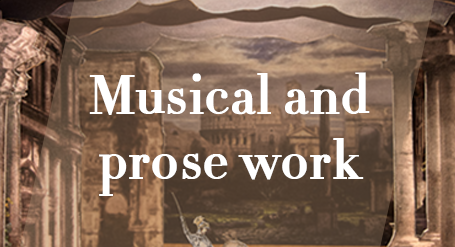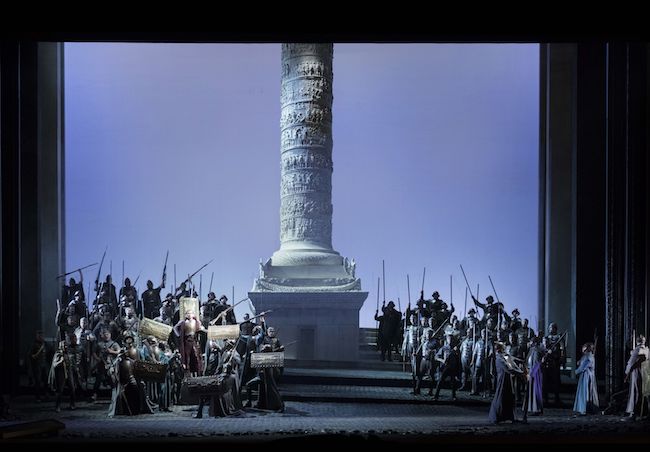
The musical work of Richard Wagner is composed of operas or “musical dramas” ranging from “Fairies” (Die Feen) to “Parsifal”. A detailed presentation of each of these major works is associated here with a set of thematic articles, placing them not only in the context of his personal life but also in his social, economic and cultural context. This section also includes all the musical works (excluding opera) and his literary work.
Rienzi, The Last of the Tribunes, WWV49
Rienzi, der letzte der Tribunen, WWV49
SYNOPSIS
Grand Opera in five acts
Libretto and music by Richard Wagner,
after Edward Bulwer-Lytton’s novel Rienzi, the Last of the Roman Tribunes (1835)
Premiere :
20th october 1842, Hofoper Dresden, led by Carl Gottlieb Reissiger
![]()
Overture
The opera opens with a substantial overture which begins with a trumpet call (which in Act 3 we learn is the war call of the Colonna family) and features the melody of Rienzi’s prayer at the start of Act 5, which became the opera’s best-known aria. The overture ends with a dazzling military march.
ACT ONE
Outside Rienzi’s house
The patrician Orsini and his cronies attempt to kidnap Rienzi’s sister Irene. Stefano Colonna, also a patrician but inclined to support Rienzi, prevents them. Raimondo appeals to the parties in the name of the Church to stop their fighting; Rienzi’s eventual appearance (marked by a dramatic key shift, from D to E flat) quells the riot. The Roman people support Rienzi’s condemnation of the nobles. Irene and Adriano realise their mutual attraction (Duet “Ja, eine Welt voll Leiden” (Yes, a world of sorrows)). A gathering crowd of plebeians, inspired by Rienzi’s speeches, offers Rienzi the crown; he demurs, insisting that he wishes only to be a Tribune of the Roman people.
![]() ACT TWO
ACT TWO
A hall in the Capitol
The patricians plot the death of Rienzi; Adriano is horrified when he learns of this. Rienzi greets a group of ambassadors for whom an entertainment (a lengthy ballet) is laid on. Orsini attempts to stab Rienzi, who however is protected by a vest of chain-mail. Adriano pleads with Rienzi for mercy to the nobles, which Rienzi grants.
The Act 2 ballet is noteworthy as Wagner made a clear attempt to make it relevant to the action of the opera (whereas in most Grand Operas the ballet was simply an entertaining diversion). The Rienzi ballet was intended to tell the tale of the ‘Rape of Lucretia‘. This storyline (in which Tarquinius, the last king of Rome, attempts to rape the virtuous Lucretia), parallels both the action of Rienzi (Orsini’s attempt on Irene) and its background (patricians versus the people). In its original form the ballet lasts for over half an hour – in modern performances and recordings it is generally drastically cut.
![]() ACT THREE
ACT THREE
The Roman Forum
The patricians have recruited an army to march on Rome. The people are alarmed. Rienzi rouses the people and leads them to victory over the nobles, in the course of which Adriano’s father Stefano is killed. Adriano swears revenge, but Rienzi dismisses him.
![]()
ACT FOUR
Before the Lateran Church
Cecco and other citizens discuss the negotiations of the patricians with the Pope and with the Emperor of Germany. Adriano’s intention to kill Rienzi wavers when Rienzi arrives together with Irene. Raimondo now announces that the Pope has laid a papal ban on Rienzi, and that his associates risk excommunication. Despite Adriano’s urgings, Irene resolves to stay with Rienzi.
![]() ACT FIVE
ACT FIVE
Scene 1: A room in the Capitol
Rienzi in his prayer “Allmächt’ger Vater” (Almighty Father) asserts his faith in the people of Rome. He suggests to Irene that she seeks safety with Adriano, but she demurs. An apologetic Adriano enters and tells the pair that the Capitol is to be burnt and they are at risk.
Scene 2: The Capitol is ablaze
Rienzi’s attempts to speak are met with stones and insults from the fickle crowd. Adriano, in trying to rescue Rienzi and Irene, is killed with them as the building collapses.
In the original performances, Rienzi’s final words are bitter and pessimistic: “May the town be accursed and destroyed! Disintegrate and wither, Rome! Your degenerate people wish it so.” However for the 1847 Berlin performance Wagner substituted a more upbeat rhetoric: “Ever while the seven hills of Rome remain, ever while the eternal city stands, you will see Rienzi’s return!“.
If you wish to share further information about this article, please feel free to contact us !
